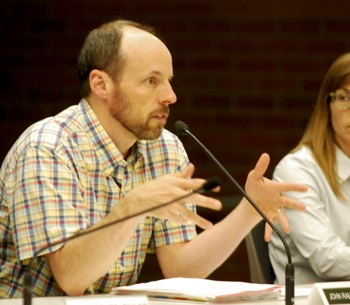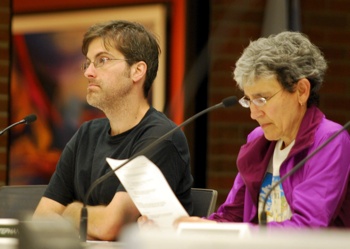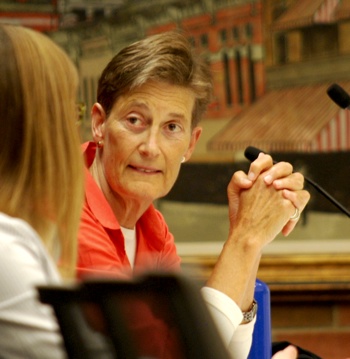Greenbelt Communications Plan In Progress
Ann Arbor greenbelt advisory commission meeting (July 3, 2014): Commissioners spent most of their relatively brief July meeting in closed session to discuss land acquisition.

John Ramsburgh serves on the greenbelt advisory commission’s communications committee. (Photos by the writer.)
The main discussion in open session focused on an update from GAC’s communications committee. The committee has recommended creating an internship for the city’s greenbelt program, drawing from students at the University of Michigan. John Ramsburgh, a GAC member who works for UM’s College of Literature, Science & the Arts, said that his unit could provide office space and resources for the intern.
The work would entail a range of projects, including collaboration with city GIS staff to develop driving or biking maps of greenbelt-protected properties, and drafting Twitter posts and Facebook updates that would promote the greenbelt program. After other commissioners reached consensus to support this approach, Ramsburgh said he’d post the opening with the hope of selecting an intern for the fall semester.
Also at the July 3 meeting, Ginny Trocchio – who provides staff support for the greenbelt program – told commissioners that the city had recently closed a deal to purchase development rights for about 20 acres along Zeeb Road in Webster Township. The transaction brings the total of greenbelt-protected property to a bit over 4,300 acres.
Communications Plan
John Ramsburgh gave an update on work of GAC’s communications committee. Other members are Stephanie Buttrey and Jean Cares. He reported that committee members and Ginny Trocchio, who provides staff support for GAC, met with the city’s communication liaisons to talk about creating a comprehensive communications plan and facilitating outreach for the greenbelt program.
The communications staff described various methods that can be used, including the city’s email distribution system, press advisories, and social media accounts. There’s a great opportunity for the greenbelt program to increase its media presence both through the city’s parks and recreation unit, but also through GAC’s own individual efforts, he said.
One idea is to post a position for an intern at the University of Michigan, with preference for someone in the program in the environment and communications studies, or someone who has background in social media.
The intern would do work outlined by GAC’s communications committee, including:
- Research other local groups who might have interest in the greenbelt;
- Collaborate with city GIS staff to develop driving or biking maps of greenbelt-protected properties;
- Research other farmland preservation programs across the country to see what’s working or not;
- Draft Twitter feeds and Facebook updates that could be passed along to staff;
- Develop a calendar of events of greenbelt activities;
- Help volunteer at events that can highlight GAC’s work.
Ramsburgh said the hope is to post the position through the internship website of UM’s College of Literature, Science, and the Arts and perhaps fill the position in the fall. Ramsburgh had volunteered to post it, and serve as the liaison since there’s space in his unit at UM to accommodate an intern. [Ramsburgh is a development officer for LS&A.] His office could provide a place for the intern to work, and other resources.

From left: Greenbelt advisory commissioners Shannon Brines and Stephanie Buttrey. Buttrey serves on GAC’s communications committee.
Trocchio reported that Tweets and Facebook posts can be drafted in advance, then scheduled to be posted once a day or once a week. That way, people are regularly getting updates about the greenbelt, she said. “It’s just a way to really increase our presence.”
Catherine Riseng asked if this intern was envisioned as an ongoing position, or just a one-semester job. Ramsburgh replied that there’s enough work for a one-semester internship. But considering the grassroots groundswell of support within the university and student community for the kinds of things that the greenbelt program is doing, “this might be something that would become an ongoing internship,” he said. GAC could develop an ongoing relationship with UM’s School of Natural Resources & Environment, or LS&A’s program in the environment – programs where there are students who want to get involved in this kind of work.
Ramsburgh said it wouldn’t be good to set it up to have regular social media and other activity for a period, “then, all of a sudden, stop.” One of the things that the committee would like the intern to do is to compile a media list that’s unique to GAC. It would complement the city’s media list, but would include national interest groups that would like to follow what Ann Arbor’s greenbelt program is doing, he said.
So the internship would be set up to handle the research and background projects first, he said, then move slowly into other work so that they don’t set up expectations that can’t be met in an ongoing way.
Ramsburgh also cautioned that there’s no guarantee that students would apply for the internship. If that happens, GAC might want to approach other institutions in southeast Michigan, he said.
Commissioners didn’t take a formal vote, but reached consensus for Ramsburgh to proceed and post the internship for this fall.
Staff Update
Ginny Trocchio gave a brief update, noting that the city had recently closed on the acquisition of about 20 acres on Zeeb Road, north of Joy Road. It’s now part of a block of land that’s been previously protected with greenbelt funds, and brings the total of greenbelt-protected property to just over 4,300 acres.
By way of background, the Ann Arbor city council – at its Sept. 3, 2013 meeting – had approved the purchase of development rights for the Jane Sheldon and Robert Wolf property in Webster Township. The approval had been for an amount not to exceed $82,067 using funds from the city’s open space and parkland preservation millage. That amount included $43,200 toward the purchase price of $47,500.
The city also paid for due diligence and closing costs, and $23,867 toward an endowment for potential future legal and enforcement expenses. Webster Township contributed $2,000 toward the purchase. Other funds included $2,300 from a contribution that Cherry Republic made to the city.
GAC had recommended the deal at its May 2, 2013 meeting.
Land Acquisition
Most meetings of the greenbelt advisory commission include a closed session to discuss possible land acquisitions. The topic of land acquisition is one allowed as an exemption by the Michigan Open Meetings Act for a closed session.
On July 3, commissioners met in a closed session that lasted about 30 minutes.
When they emerged, they did not take any votes related to land acquisition.
Next scheduled meeting: Thursday, Aug. 14, 2014 at 4:30 p.m. in the second-floor council chambers at city hall, 301 E. Huron. [Check Chronicle event listings to confirm date] The meetings are open to the public and include two opportunities for public commentary.
Present: Peter Allen, Shannon Brines, Stephanie Buttrey, Archer Christian, Jennifer Fike, John Ramsburgh, Catherine Riseng (chair), Christopher Taylor. Staff: Ginny Trocchio.
Absent: Jean Cares.
The Chronicle survives in part through regular voluntary subscriptions to support our coverage of publicly-funded entities like the city’s greenbelt program. If you’re already supporting The Chronicle, please encourage your friends, neighbors and coworkers to do the same. Click this link for details: Subscribe to The Chronicle.





Excellent work, GAC. I look forward to seeing the social-media updates. I bike past the Wolf properties frequently, a nice addition to the Greenbelt.